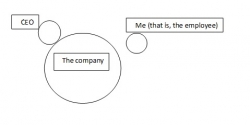One of the most popular articles from my blog is one I published last year on coping with employee absenteeism. In the article, I discuss how, 15 years ago, the significantly high rate of employee absenteeism was handled through positive rewards for employees who were never absent, along with interest and concern for the health of anyone at home sick.
Hundreds of Internet surfers read this article each week and it has received dozens of comments on Facebook. More and more of these comments refer to an unfairness towards employees who were ill and subsequently not invited to our annual event celebrating employees who had never missed a day of work that year.
The VP of Human Resources at one company even said it wasn't right to punish mothers (or fathers) who had to stay at home with a sick child (where punishment was not getting a prize or being invited to the annual event).
I am a strong believer in the power and importance of fairness, but I had been blind to the view that feels not getting a prize might be unfair.
On the power of fairness in generating employee motivation
I will devote the current article to a Ted talk a friend sent me entitled: The surprising ingredient that makes business work better. The speaker is Marco Alvera, CEO of Snam, an Italian company for natural gas infrastructure with 3,000 employees and a net worth of more than €13 billion.
Near the end of his talk, Alvera says this: "I lead a team of 3,000 excellent people, and the difference between 3000 happy, motivated team workers and 3,000 clock watchers is everything." He has set out to ensure fairness at the major company he manages.
Some of his opinions: Unfairness affects us so strongly that our sense of reason disappears. Unfairness is one of the root factors in polarization and division in the society we live in, and at work, unfairness leads to disengagement from the business and workplace.
Alvera states that American researchers have shown that 70% of workers are disengaged from, or indifferent towards, the companies they work at. This situation results in a loss of $ 550 billion a year to the American market.
Fairness helps build a consolidated team
Alvera left American investment bank Goldman Sachs for an Italian company for natural gas infrastructure, which was state-owned. He came from a background where workers are granted salary raises and bonuses and moved to a company with fixed salaries and lifelong employment.
He describes his frustration in his new situation, and his subsequent discovery that the Italian company's output was among the best in the world, and that they knew how to find natural gas better than any other company.
Alvera, like many others, tried to figure out the secret of their success. At first, he thought it was luck, but it would be hard to imagine that they could be lucky year after year. They had neither extraordinary expertise from outside the company, nor any particularly unique work methods.
Alvera finally realized what the key ingredient was. It was fairness.
Workers weren't just hired for brief periods to attain short term success. They knew they would be rewarded for their overall performance and not on individual successes. They knew they wouldn't be fined or punished for bad luck (dry wells) or errors.
They knew they were appreciated for their efforts and that the company would always stand behind them. They knew they were part of a community and were appreciated as human beings.
Alvera found that the definition of ideal fairness is "when you can fold down your antenna in your search for unfairness". Workers could dedicate themselves to the goal – searching for natural gas (or any other company objective) and not worrying about inner politics. They could take risks without fear.
They could trust their colleagues and managers without having to constantly watch their backs. An excellent work team was created.
The workers acted for the good of the company, not falling back selfishly for the sake of convenience and speed. They made achievements no bonus could buy.
The scientific basis for the effects of fairness and unfairness
Alvera was so excited about what he had discovered that he began to look into the scientific basis for his discovery.
He found that fairness also affects other companies that don't have fixed salaries and lifelong positions. Behavioral research has shown that people sense fairness (or unfairness) even before they begin to analyze the situation and reach logical conclusions.
Fairness brings us satisfaction, and unfairness causes us pain.
The reasonfor this is that fairness works on the primitive part of the brain (reptilian brain), and unfairness triggers a sense of threat and struggle for survival. The moment we feel threatened, we forget good things like creativity, motivation and teamwork.
This is logical, because we are social animals and need a community to survive. During the first years of our lives, we need protection and guidance. A sense of belonging to a community is important to us and unfairness triggers a threat to this feeling.
Take, for example, a case where all of our friends are invited to a mutual friend's wedding and we are not. We feel rejected from the community. This scientifically explains why fairness is good for us and unfairness pushes us into defensiveness.
Practical steps to developing fairness everywhere
When we find ourselves in an atmosphere of fairness, we tend to support and help others, and they us. But one drop of unfairness will poison the entire pool, and there are a lot of drops like these around us. So, the struggle should be to clean and filter out the unfairness from everywhere in your community and society.
As CEO, Alvera began by searching out the unfairness in himself. For example, his tendency to appreciate yes-men.
First step: Encourage an atmosphere of varied opinions and people.
The second step is more methodical: go over all procedures, regulations and methods that are related to the way we make decisions and allocate resources. Clean out whatever isn't transparent and logical.
Transparency of information: Fix whatever blocks the passage of information within the company.
The more effort we make, the harder it will be to get to the root and essence of fairness
This is because the last kilometer on the path to creation of a sense of fairness requires something else. This part involves people's feelings, needs and personal lives, which requires a community.
These matters are too complex to fit into an Excel spreadsheet, an algorithm or as part of our rational decision-making.
However, if we miss this part, we will miss a key point and we won't free ourselves from the sense of unfairness threatening us.
Therefore, Alvero says, we need to consider all of our decisions with our "internal fairness center" turned on.
These are difficult questions, but we should take the time to consider whether our rational answers are right. Inside, we know the answer. We've known it since we were babies.
To obtain the best from our work team, we need to open our hearts. Our workers can tell when we really care. Only when our workers are convinced that we really care will they put aside their fears of unfairness.
Marco Alvera's conclusions
- If fairness is such an important principle, why don't all managers give it priority?
- Wouldn't it be great to work at a company that practices fairness? To work with colleagues and managers who have been trained to be fair?
- Wouldn't it be nice to knock on the door of a fair Vice President?
Fairness isn't easy. It demands consideration and taking risks. We need to ask ourselves how to take this required risk. How do we make ourselves go beyond the rational and do what is right?
My summary
The speaker, Marko Alvera, is the CEO of a large and successful Italian, state-owned company. He came from an American management tradition that believes that money, bonuses and rewards will create success. At his new company, he couldn't put these methods into effect.
At first, he was frustrated, and then he discovered the secret of success for the company he managed: fairness, or the workers sensing that they were being treated fairly.
He discovers the positive power of fairness and the damage unfairness can do. From here, he looks at fairness in a systematic way and creates a change in patterns of action at the company he managed.
He studies his new discovery in-depth and finds out that these things are known and have a scientific basis. He presents us with a picture that sheds new light on our management patterns. I would guess that more than a few of you thought at a certain stage of reading this article that the speaker was exaggerating. So, I would like to remind you of two things:
First, breakthroughs are a change in an existing condition, and it is natural for us to reject them at first. I recommend taking the time to consider the speaker's words
The second thing is Morton Mandel's quote from his book It's All About Who You Hire, How They Lead…and Other Essential Advice From a Self-Made Leader:
"If you want to be number one with your employees, they have to know and trust that they'll be number one with you – and that starts with how you treat them". (pp 25)
Here, Morton Mandel, another extraordinarily successful manager, shows us a different view on the link between the way our workers perceive management's actions towards them and how they will contribute to the company's success.












 My First Book: Manage! Best Value Practices for Effective Management
My First Book: Manage! Best Value Practices for Effective Management